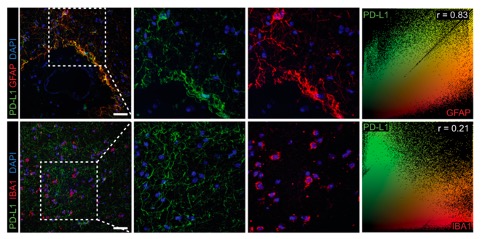Astrocytes plays an important role during neuroinflammatory conditions, because depending to CNS micromilieu, can promote or inhibit several pathological processes. Linnerbauer et Al. studied the features of the astrocytes that upregulate PD-L1 in multiple sclerosis (MS) demonstrating that:
- During the peak of experimental autoimmune encephalomyelitis (EAE) astrocytes are the glial cells that most upregulates PD-L1. Conversely, in “normal” white matter there are no expression of PD-L1 by astrocytes
- PD-L1+ astrocytes present a specific phenotype with reduced expression of proinflammatory genes and increased expression of tissue protective-genes
- Soluble PD-L1 is significantly higher in CSF of patients with clinically isolated syndrome (CIS) and relapsing-remitting MS (RRMS) but nor in progressive stages of the disease
- PD-L1 up-regulation in astrocytes is driven by the aryl hydrocarbon receptor and interferon signalling
- Blockade of PD-L1/PD1 signalling during EAE and abrogation of cd274 expression in astrocytes worsened disease
- Soluble PD-L1 derived from astrocytes drives protective pathways in microglia by binding specifically PD1
Overall, these data showed that PD-L1 expression by astrocytes plays a protective role during neuroinflammatory processes by suppressing the pro-inflammatory functions of microglia, suggesting that modulation of PD-L1/PD1 signalling in the CNS could be an interesting therapeutical target for regulating inflammatory processes in multiple sclerosis.

